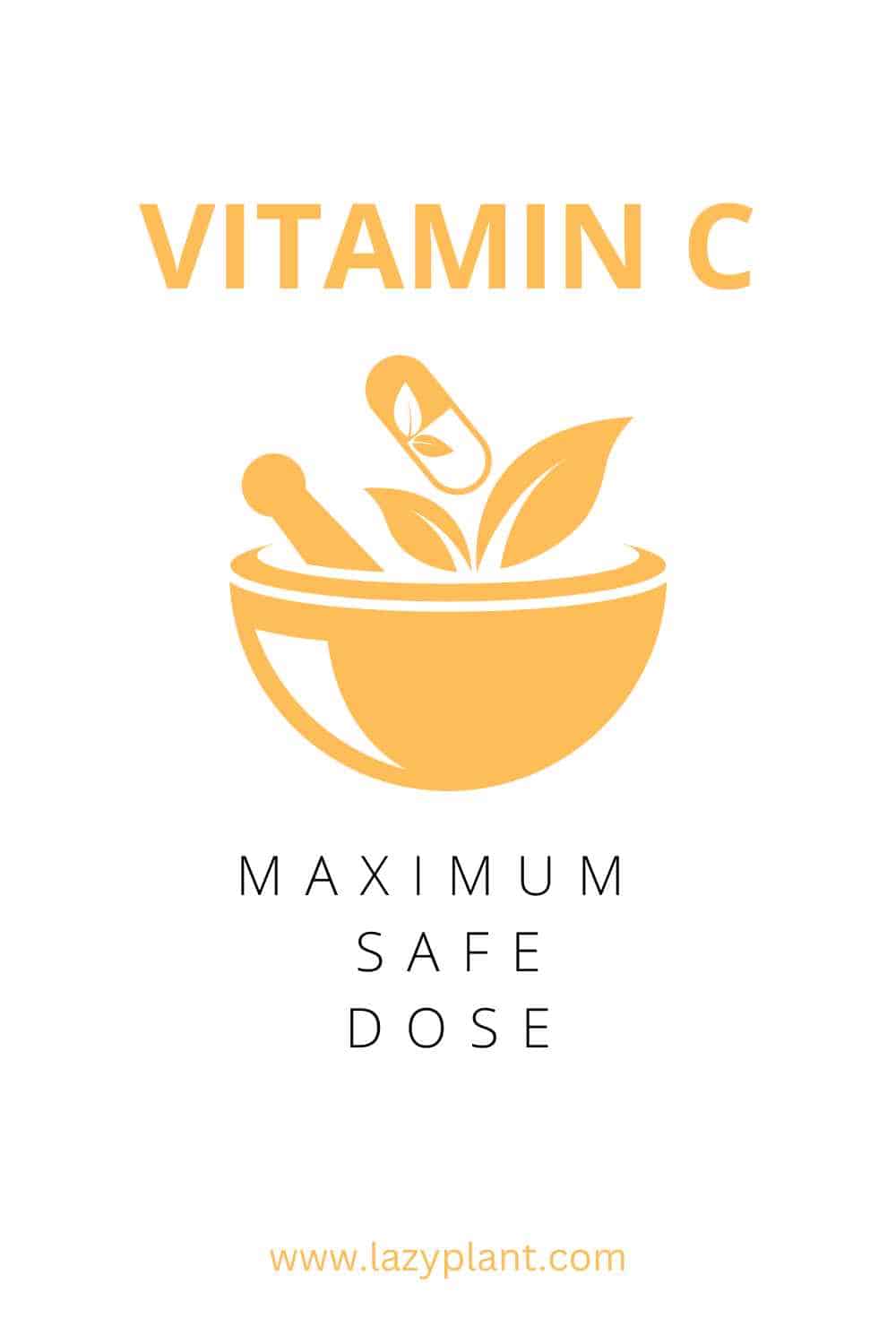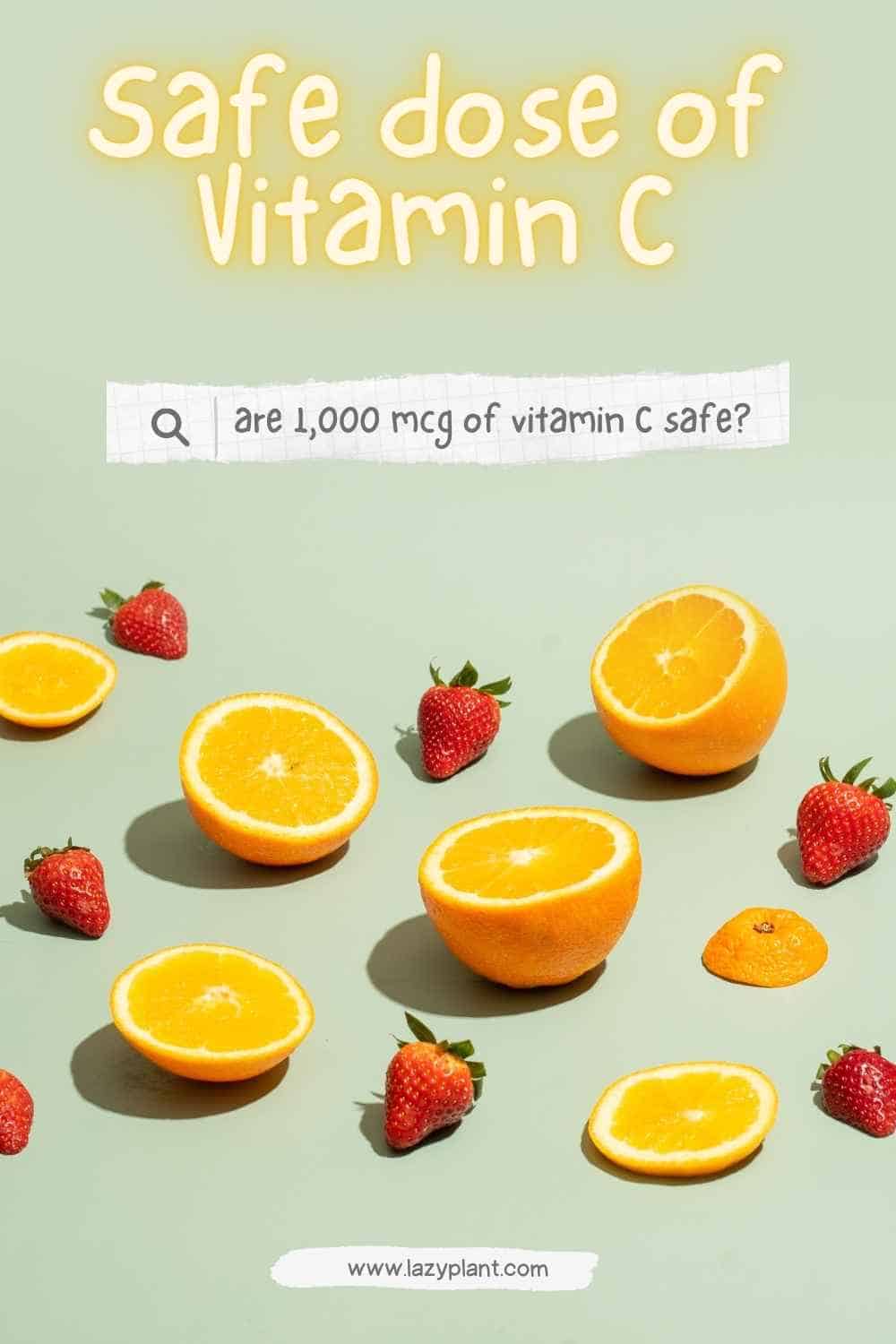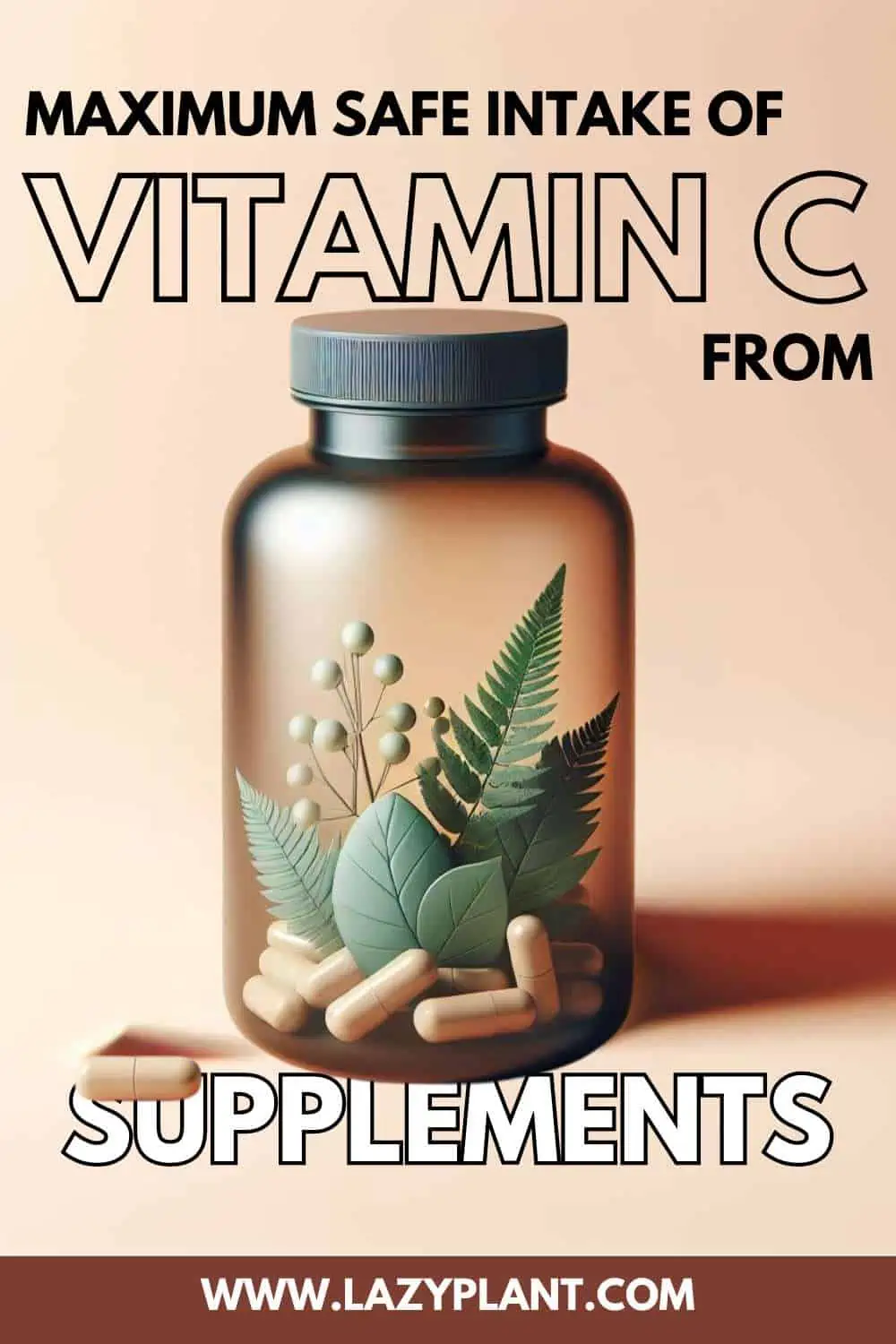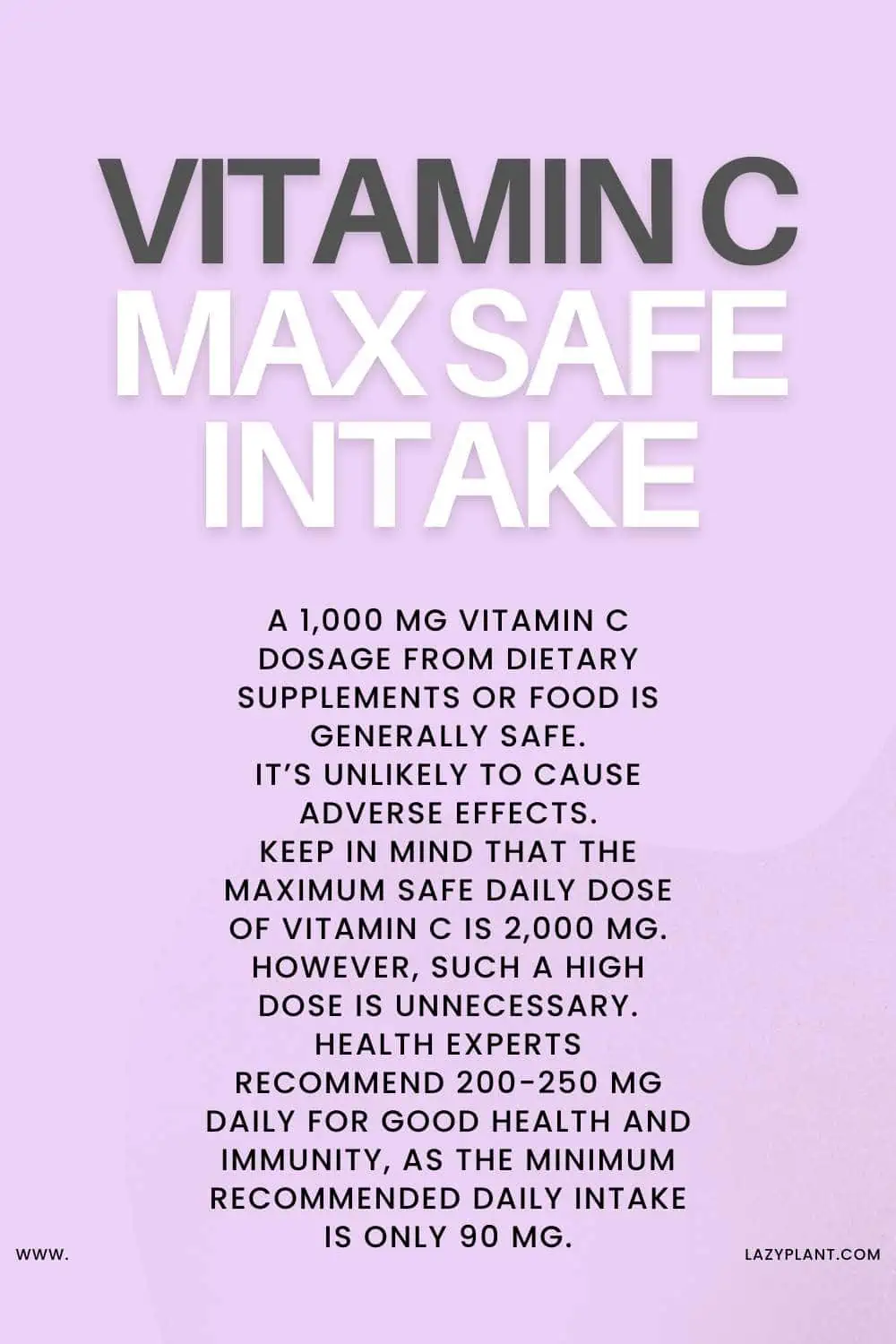vitamin C needs | side effects | Mega doses | 1,000 mg | food vs supplements
A vitamin C dosage of 1,000 mg from dietary supplements is considered pretty safe. This dose is rather unlikely to cause any side effects. After all, the maximum safe dose of vitamin C is 2,000 mg a day.
What’s the recommended daily intake of vitamin C?
The minimum recommended daily intake of vitamin C is 75–90 mg. It’s 75 mg for women and 90 mg for men. Pregnant women require at least 85 mg of vitamin C, while lactating women require at least 120 mg.
Smokers need more vitamin C per day. They need additionally 35 mg of vitamin C a day, due to increased oxidative stress. A study suggested that drinking orange juice, which is the richest common beverage in vitamin C, can increase plasma concentrations of vitamin C in humans. Smokers can benefit the most.[1]
Effects of Mega doses of vitamin C
So, most healthy people need around 100 mg of vitamin C a day. Way less than 1,000 mg, which is found in many dietary supplements. The regular intake of 1,000 mg of vitamin C is pretty safe, though.
In a study, researchers have treated cancer patients with high dosages of vitamin C, through IVC therapy (intravenous vitamin C). Scientists gave cancer patients up to 100 grams of vitamin C a day! That’s 100,000 mg. 100 times more vitamin C than the 1,000 mg dose or 100,000 times the recommended daily intake of vitamin C.[2]
Regarding cancer, researchers observed:
- survival beyond prognosis
- improvement in the quality of life
- improved tolerance of conventional therapy
- deterioration of the clinical condition, in the absence of vitamin C dosage
On the other hand, the side effects of mega dosages of vitamin C seem to be minimal. Patients experienced symptoms of Jarisch-Herxheimer reaction. This is a reaction of the body to endotoxins produced by the necrosis of harmful cells. Fever, chills, strong body odor, and pimples may be other side effects.
Don’t forget that these side effects happened to cancer patients after megadoses of vitamin C. Symptoms reduced after 2 to 3 hours after injection with vitamin C.
Most noteworthy, therapy with high dosages of vitamin C (IVC) may:
- stabilize cancer
- reduce the risk of metastasis
- keep tumor stable
- disappear breast carcinoma
- help on tumor shrinkage
- have antitumor activity in some cases
- help patients regain strength
Side effects of high doses of vitamin C from supplements
High amounts of vitamin C from dietary supplements are rather unlikely to cause any significant adverse effects.[3]
In some cases, people with a history of kidney stone formation or iron overload may experience some discomfort from high dosages of vitamin C.
High doses of vitamin C can be difficult for the kidneys to process and may even worsen existing kidney problems.
Vitamin C can increase iron absorption from the gut. While beneficial for those with iron deficiency, it can be detrimental for individuals with hemochromatosis, a condition where the body stores too much iron.
Also, patients who take certain drugs should be very cautious with vitamin C supplementation. Vitamin C may interact with some medications, so it’s important to disclose all medications you are taking to your doctor before starting supplements.

High doses of vitamin C can trigger the breakdown of red blood cells in individuals with G6PD deficiency. This is a genetic condition affecting red blood cells.
Side effects may be diarrhea, mild nausea, and other gastrointestinal disturbances due to the osmotic effect of unabsorbed vitamin C.[4]
Always consult a healthcare professional before taking supplements. Especially during pregnancy, breastfeeding, or having a known health issue.
What dosage of vitamin C is too much?
According to the National Institutes of Health, vitamin C has low toxicity, and it’s rather unlikely to cause serious adverse effects. Even at high intakes. The maximum safe dosage of vitamin C for adults is 2,000 mg per day.
Vitamin C is a water-soluble vitamin, meaning excess amounts are excreted through urine. Toxicity from food or dietary sources is very rare.
While generally safe, excessive intake (more than 2,000 mg daily) can cause side effects like diarrhea, nausea, and stomach cramps in certain individuals.
Always consult your healthcare provider before taking any dietary supplements.
What are the preferred sources of vitamin C?
There is no reason to take vitamin supplements if you follow a healthy, well-balanced diet. Vegetables and fruits are the best dietary sources of vitamin C. Most healthy adults can get enough vitamin C from a balanced diet.
Authors of some studies suggest a range of 200-500 mg of vitamin C a day as a potential optimum intake for adults to maximize vitamin C’s health benefits while staying well below the tolerable upper limit set at 2,000 mg a day.
Can I take 1,000 mg of vitamin C from food?
Consuming large quantities of fruits and vegetables would be necessary to reach 1,000 mg. This might not be realistic or enjoyable for everyone. You would need to incorporate a wide variety of fruits and vegetables throughout the day to ensure sufficient intake.
Most people don’t consistently consume enough fruits and vegetables to even reach 250 mg of vitamin C a day!
Focus on incorporating a variety of fruits and vegetables into your diet for their overall nutritional benefits, and consider a lower-dose vitamin C supplement (around 250-500 mg) if needed to fill any gaps.
Is a daily dose of 1,000 mg safe?
In general, getting up to 1,000 mg of vitamin C is pretty safe. Most people are rather unlikely to experience any side effects.
Actually, it’s a good idea to boost vitamin C intake. For instance, in the winter, vitamin C seems to be beneficial against the flu and the common cold. It may boost the immune system.

We should take at least 1,000 mg of vitamin C during the summer, as well. Vitamin C naturally boosts collagen production, and protects us from skin aging!
Also, we need adequate amounts to lose weight.
Certainly, eating foods high in vitamin C is the best way to get the recommended daily intake. But, boosting vitamin C intake from supplements could be beneficial as well. Especially, during certain times of the year!
You’ll find a wide variety of vitamin C supplements on iHerb.
Can I take Vitamin C supplements every day?
Yes, most people can take a 1,000 mg vitamin C supplementation every day. But, you likely don’t need such high dosages daily. A 1,000 mg supplement might be unnecessary and could lead to exceeding your daily needs.
Only certain medical conditions or risk factors may increase your vitamin C needs.
Consider a more moderate dose (around 250-500 mg) if you suspect a deficiency but don’t necessarily need 1,000 mg.
Prioritize incorporating more fruits and vegetables into your meals and snacks.
Seasonal intake of high Vitamin C doses
You could take 250-1,000 mg of vitamin C at certain times of the year. You may have increased needs during winter or summer times.
Winter
While vitamin C has long been associated with preventing the common cold, research shows it doesn’t offer complete protection.
However, some studies suggest that consuming sufficient vitamin C, either through diet or low-dose supplements (around 250-500mg daily), might slightly reduce the duration or severity of colds in adults.
High-dose supplementation (above 1,000 mg daily) is not necessary to achieve this potential benefit.
Citrus fruits, broccoli, cauliflower, kale, and spinach are among the best dietary sources of vitamin C during winter months.

Summer
Sunburn can deplete vitamin C levels, but increased intake from fruits and vegetables is generally sufficient. After all, almost all summer fruits are packed with vitamin C.
Sun exposure can lead to the production of free radicals in the body, which can deplete vitamin C stores. While the exact amount of vitamin C lost due to sun exposure is unclear, research suggests that increased dietary intake from fruits and vegetables can help replenish these stores and potentially offer some protection against sunburn.
Vitamin C is not a sunscreen and should not be used as a substitute for sun protection measures like wearing sunscreen, seeking shade, and covering up with clothing.
What’s the best time to take a 1,000 mg tablet?
There isn’t a definitive “best” time for everyone to take a 1,000 mg vitamin C pill:
Vitamin C is a water-soluble vitamin, meaning it dissolves in water and gets absorbed by the body relatively quickly. Vitamin C can be taken with or without food. However, taking it with food might reduce the chance of stomach upset for some people.
High doses of vitamin C (above 500 mg) can sometimes cause stomach upset in some individuals. To potentially minimize stomach discomfort, some people prefer to divide their vitamin C intake throughout the day.
Splitting your dose could involve taking 500 mg in the morning and another 500 mg in the afternoon.
Also, you could take your 1,000 mg of vitamin C with a meal, ideally breakfast or lunch, to minimize stomach upset.
What’s the best type of vitamin C supplement?
There’s no single “best” type of vitamin C supplement for everyone, as the ideal choice depends on individual needs and preferences.
Types of Vitamin C Supplements:
- Ascorbic Acid: This is the most common and affordable form of vitamin C supplement. It’s well-absorbed by the body, but high doses can irritate the stomach.
- Ester-C (Calcium Ascorbate): This buffered form of vitamin C is gentler on the stomach but might be slightly more expensive than ascorbic acid.
- Sodium Ascorbate: Similar to Ester-C, this form is gentler on the stomach but may not be suitable for individuals on sodium restriction.
- Liposomal Vitamin C: This form uses liposomes (fatty spheres) to deliver vitamin C, potentially leading to higher absorption rates. However, it’s typically the most expensive option.
- Chelated Vitamin C: This form combines vitamin C with minerals like glycine or lysine, potentially improving absorption and reducing stomach upset. Research on its effectiveness is ongoing.
If you experience stomach upset with ascorbic acid, consider Ester-C, sodium ascorbate, or a lower dose.
Ascorbic acid is the most affordable option, while liposomal forms are more expensive.
Tips:
- Look for USP (United States Pharmacopeia) or NSF (National Sanitation Foundation) certified supplements for quality assurance.
- Consider chewable tablets or gummies if you have difficulty swallowing pills.
- Store supplements in a cool, dry place to maintain potency.
8+1 Myths of Vitamin C supplementation
Myth: Everyone needs a vitamin C supplement. Reality: Most healthy adults can get enough vitamin C from a balanced diet rich in fruits and vegetables.
Myth: Vitamin C cures the common cold. Reality: While vitamin C may slightly reduce the duration or severity of a cold, it’s not a cure.
Myth: High-dose vitamin C boosts the immune system significantly. Reality: The evidence is mixed on whether high-dose vitamin C supplements significantly enhance the immune system in healthy people.

Myth: Vitamin C prevents cancer. Reality: While research suggests potential benefits, there’s no conclusive evidence that vitamin C supplements directly prevent cancer.
Myth: Vitamin C is a powerful antioxidant that fights all free radicals. Reality: Vitamin C is one of many antioxidants, and the body has its own natural antioxidant defenses.
Myth: More vitamin C is always better. Reality: High doses (over 1,000 mg/day) can cause side effects like diarrhea, nausea, and stomach cramps.
Myth: Natural vitamin C from fruits is better than supplements. Reality: Your body absorbs vitamin C from both food and supplements similarly. However, it’s preferred to take vitamin C from food because they offer a wider range of nutrients besides vitamin C, including fiber, antioxidants, vitamins, and minerals. These contribute to overall health and can work synergistically with vitamin C. Supplements typically only contain isolated vitamin C.
Myth: Vitamin C supplements can help you lose weight. Reality: While vitamin C plays a role in metabolism, there’s no scientific evidence it directly aids weight loss.
Myth: Vitamin C supplements expire and become ineffective. Reality: Vitamin C can lose potency over time, but it doesn’t expire and can still offer some benefits. However, it’s best to check the expiration date and use supplements within a reasonable timeframe.
You’ll find a wide variety of vitamin C supplements on iHerb.
Always discuss your specific needs and preferences with a doctor or registered dietitian for personalized advice on choosing the best type of vitamin C supplement for you.